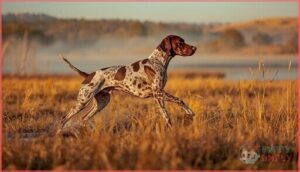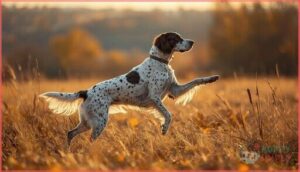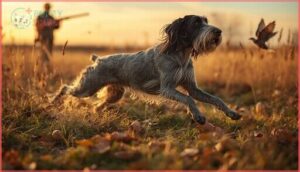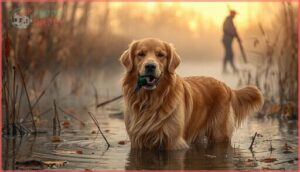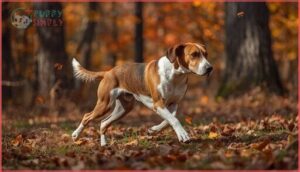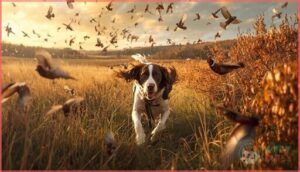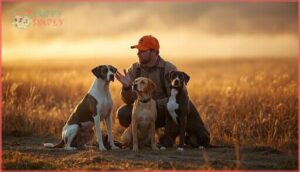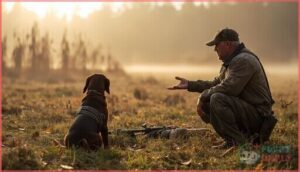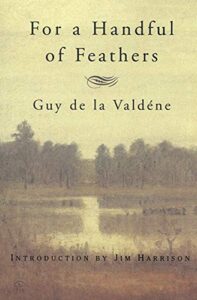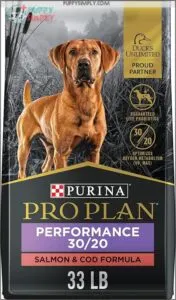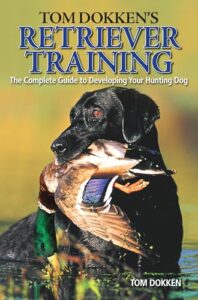This site is supported by our readers. We may earn a commission, at no cost to you, if you purchase through links.
I’ve spent twenty-three seasons watching dogs work in the field, and I’ll tell you this: the difference between a good hunt and a great one often comes down to the four-legged partner at your side. A properly matched hunting dog doesn’t just retrieve birds or track game—it reads terrain you haven’t noticed, picks up scent trails invisible to human senses, and pushes through conditions that would send most creatures running for shelter.
Whether you’re after waterfowl in frigid marshes, upland birds in thick cover, or small game through dense brush, the best hunting dog breeds for the outdoors bring specialized skills honed over generations of selective breeding. The challenge isn’t finding a capable hunting dog; it’s finding the right one for your specific style, terrain, and quarry.
Table Of Contents
- Key Takeaways
- Best Hunting Dog Breeds for The Outdoors
- Labrador Retriever – Versatility and Waterfowl Skill
- German Shorthaired Pointer – All-Purpose Hunting Ability
- English Setter – Upland Game Expertise
- Chesapeake Bay Retriever – Rugged Waterfowl Specialist
- Beagle – Small Game Tracker
- German Wirehaired Pointer – Versatile Pointing and Retrieving
- Golden Retriever – Family-Friendly Bird Dog
- Bluetick Hound – Scent-Tracking for Small Game
- American Foxhound – Speed and Endurance for Big Game
- English Springer Spaniel – Flushing and Retrieving Game
- How to Choose The Right Hunting Dog
- Training and Caring for Hunting Dogs
- Top Products for Hunting Dog Owners
- Frequently Asked Questions (FAQs)
- What are the typical health concerns in hunting dog breeds?
- How do I introduce a new puppy to my household?
- Can I have a hunting dog in a small apartment?
- How do I handle hunting dog emergencies in the field?
- What age should I start training my hunting dog?
- How much does a quality hunting dog cost?
- Can hunting dogs live indoors with families?
- What vaccines do hunting dogs need annually?
- How do I prevent ticks on my hunting dog?
- Conclusion
Key Takeaways
- Choosing the right hunting dog hinges on matching breed traits to your specific quarry, terrain, and hunting style—Labradors dominate waterfowl retrieval with 95% of NAHRA Master titles, while German Shorthaired Pointers excel as versatile all-purpose hunters across upland birds, waterfowl, and small game.
- Training success starts early with obedience work at 8 weeks and builds through structured field sessions, with most hunting dogs reaching full capability by 3 years if you commit to 60-120 minutes of daily exercise and consistent scent work that mirrors actual hunting conditions.
- Field performance depends heavily on proper nutrition and health management—high-protein diets (30-40%) fuel endurance while proactive care prevents the orthopedic injuries, tick-borne diseases, and heat-related emergencies that sideline over 41% of working dogs.
- The best hunting dog breeds aren’t just tools but true collaborators who read terrain you miss, work through punishing conditions, and strengthen with every season if you invest in the right match, consistent training, and vigilant health protocols from puppyhood forward.
Best Hunting Dog Breeds for The Outdoors
Choosing the right hunting dog can make or break your experience in the field, and it all starts with understanding which breeds bring the skills you actually need. Some dogs live for the water, others thrive in thick brush, and a few can handle just about anything you throw their way.
Here’s a look at ten breeds that have earned their place among hunters who demand performance, loyalty, and that unshakeable drive to work.
Labrador Retriever – Versatility and Waterfowl Skill
The Lab—America’s top gundog for over two decades—isn’t just popular by accident. You’re looking at a breed that dominates field trials, with 95% of NAHRA’s Master Hunting Retriever titles going to Labs, and their thick double coat, webbed paws, and rudder-like otter tail make them unbeatable in cold-water waterfowl retrieval. As a popular choice, Labrador retrievers excel in waterfowl hunting.
Why Labs Excel in the Field:
- Waterfowl Training mastery with powerful swimming abilities in frigid conditions
- Versatility Benefits across upland birds, driven shooting, and walking behind pointers
- Field Dominance proven by 87% of NAHRA Working Retriever titles
- Breed Popularity ranking second among bird dog enthusiasts at 16%
- Family Companion qualities with remarkable trainability and gentle temperament
German Shorthaired Pointer – All-Purpose Hunting Ability
While Labs own the water, the German Shorthaired Pointer reigns as the definitive jack-of-all-trades among gundogs. With 69% grab-bite instinct and natural pointing from puppyhood, these adaptable hunting dogs tackle upland birds, waterfowl, rabbits, raccoons, and deer with minimal training. Their field performance speaks volumes—males stand 23-25 inches, females 21-23 inches, combining water-resistant coats with webbed feet for any terrain. German Shorthaired Pointers are known to be athletic and intelligent dogs, making them highly trainable.
| Category | Males | Females |
|---|---|---|
| Height | 23-25 inches | 21-23 inches |
| Weight | 55-70 pounds | 45-60 pounds |
| Prey Drive Response | 62% hunt response | 62% hunt response |
| Popularity Ranking | AKC No. 10 (2024) | AKC No. 10 (2024) |
English Setter – Upland Game Expertise
Where the GSP muscles through terrain, the English Setter glides like a ballet dancer across upland covers—your classic pointing breed for grouse, woodcock, and quail.
Field trials showcase their artistry: 139 AKC Field Champion titles prove these dogs freeze on scent with breathtaking precision. Males stand 25–27 inches, females 23–25, requiring 60–90 minutes daily exercise and patient setter training since they mature slower than Pointers—but that soft mouth and moderate range keep birds within gun distance every time.
Chesapeake Bay Retriever – Rugged Waterfowl Specialist
When waterfowl hunting turns brutal—ice breaking, near-freezing water, 300-duck days—the Chesapeake Bay Retriever thrives where softer breeds quit. That oily double coat sheds water like duck feathers, and their historical roles included pulling fishing nets. Their protective temperament demands early socialization.
Training challenges? Absolutely, they’re stubborn and high-drive, but channel that retrieving instinct with play-based obedience and you’ve got a waterfowl specialist built for punishment.
Beagle – Small Game Tracker
Rabbit hunting feels different with a Beagle—that musical bay cuts through thick cover, signaling they’ve locked onto scent with 97% accuracy. These compact scent hounds average 20 mph, bursts hitting 26, combining endurance with maneuverability through brush where larger breeds struggle.
Their determination prioritizes capture over mere pursuit—that’s retriever-level commitment in scent hound form.
- Pack hunting dynamics: They work cooperatively, maintaining scent trails while positioning you for clean shots
- Training techniques: Start leash work early, reinforce scent-over-sight focus through distraction-free environments
- Hunting versatility: Excel on rabbits, hares, even pheasants when conditions demand persistent tracking
- Breed health considerations: Manage allergy-related ear infections (75% occurrence) to prevent field interruptions
- Small game hunting advantage: Moderate size (13-16 inches) navigates dense terrain larger hunting dog breeds can’t access
German Wirehaired Pointer – Versatile Pointing and Retrieving
German Wirehaired Pointers excel in versatility, combining the range of pointing breeds with exceptional retrieving skills. Their dual-purpose design has earned them 140 Field Champion titles and impressive 86.78 junior test scores. However, their medium gallop requires patience during upland bird hunting.
These adaptable dogs demand dedicated care. Brush them twice weekly to manage seasonal shedding, and monitor for hip dysplasia. Commit to two-hour daily training sessions, emphasizing firm consistency over harsh corrections. Field trialing effectively proves their hunting performance, showcasing their unique abilities.
Golden Retriever – Family-Friendly Bird Dog
Golden Retrievers rank among the top 10 sporting breeds for dual-role suitability—excelling in marshes and fields, then shifting effortlessly into family life. Their friendly temperament concerns vanish with kids; they’re patient, gentle, and fourth in trainability.
But understand the health risks: hip dysplasia affects 53–73%, and cancer shortens working years. Field-bred lines demand structured training methods from puppyhood, blending obedience with retrieval drills for waterfowl and upland birds alike.
Bluetick Hound – Scent-Tracking for Small Game
Bluetick Hounds possess up to 300 million olfactory receptors—sixty times your own—enabling them to follow raccoon trails aged 4–12 hours across miles of rough terrain. Their distinctive bawl carries nearly a mile, signaling every phase of the hunt.
Expect 45–80 pounds of relentless scent-tracking prowess, bred specifically for nocturnal small-game work in swamps and forests where cold-nosed persistence separates trophy nights from empty-handed walks home.
American Foxhound – Speed and Endurance for Big Game
American Foxhounds don’t just chase—they relentlessly pursue foxes, coyotes, and wild boar with stamina that outlasts most hunters’ saddle endurance. Weighing 65–75 pounds and standing 21–25 inches tall, these pack hunting specialists track scent trails for hours across rugged terrain, their distinctive baying echoing up to a mile away.
Training challenges arise from their independent streak and prey-driven nose, demanding experienced handlers who respect breed health considerations and understand hound breeds’ need for tireless daily exercise.
English Springer Spaniel – Flushing and Retrieving Game
English Springer Spaniels execute that heart-pounding flush—crashing through brambles to launch pheasants skyward within gun range—then switch gears to deliver birds tenderly to hand. Standardized in early 20th-century Britain, these 40–50-pound dynamos quarter in windshield-wiper patterns 20–40 meters out, their noses reading every scent molecule.
Daily two-hour workouts keep these upland bird hunting machines field-ready through multi-season careers, their biddable temperament making spaniels responsive partners when flushing dogs meet experienced handlers.
- Flushing techniques: Aggressive, confident drives through dense cover
- Retrieving instincts: Strong natural desire requiring early reinforcement
- Spaniel training: Steadiness drills using clip-wing birds
- Field trials: Scoring on marking, delivery, perseverance
- Breed health: Screen for hip dysplasia, progressive retinal atrophy
How to Choose The Right Hunting Dog
Choosing the right hunting dog isn’t just about picking the breed that looks best in the field—it’s about finding a partner that matches how you hunt, where you hunt, and the life you live when you’re not chasing game. The wrong match can turn training into a frustration and hunts into missed opportunities, while the right dog becomes an extension of your own instincts out there.
The right hunting dog becomes an extension of your instincts in the field, matching how and where you hunt
Here’s what you need to think about before you bring a hunting dog into your life.
Evaluating Your Hunting Style and Game Preferences
Your hunting style determines which dog breed will become your trusted partner. Consider what you’re actually pursuing—upland game birds like pheasants and grouse naturally align with pointing breeds, while waterfowl demands a retriever’s water-loving nature. Small game tracking? You’ll want a scent hound’s nose leading the way.
Match your personal abilities and dog experience with breed energy levels—some hunting techniques require covering miles daily, while others suit close-working flushers. Your family lifestyle matters too; adaptable breeds excel when you’re chasing multiple game types across varied hunting environments throughout the season.
| Hunting Style | Primary Game | Top Breed Match |
|---|---|---|
| Upland Bird Hunting | Pheasants, Grouse | German Shorthaired Pointer |
| Waterfowl Retrieval | Ducks, Geese | Labrador Retriever |
| Small Game Tracking | Rabbits, Squirrels | Beagle |
Considering Environment and Terrain
Your terrain shapes what breed thrives beside you—forest navigation demands protective coats like those German Wirehaired Pointers sport in 78% of rugged hunts, while wetland prowess separates Chesapeake Bay Retrievers with their 95% cold-water success. Mountain endurance? Norwegian Elkhounds cover 25 kilometers through rocky ground. Field adaptability and winter resilience aren’t luxuries—they’re necessities matching hunting environments to breed capabilities.
- German Shorthaired Pointers navigate dense forests with protective wiry coats in 92% of field trials
- Chesapeake Bay Retrievers excel in icy wetlands with 95% retrieval success in harsh conditions
- Norwegian Elkhounds demonstrate mountain endurance covering 25 km over rocky terrain daily
- English Setters hunt prairie expanses covering 40-50 km across open fields with precision
- GPS-equipped hounds maintain 59% tracking efficiency while covering 18-20 km in snowy forests
Assessing Breed Temperament and Family Compatibility
Beyond field performance, your hunting partner shares your home—Labradors bring 95% social compatibility with children, blending gentle disposition with family energy. German Shorthaired Pointers suit active households investing in training, while Golden Retrievers demonstrate high affection levels and patience during unpredictable child behaviors.
Protective instincts matter, too—English Setters bond deeply with all family members, thriving in involved lifestyles that balance hunting ambitions with family life.
Health, Grooming, and Maintenance Needs
Your dog’s wellbeing determines field performance and longevity. Hunting dog breeds face elevated tick-borne diseases, musculoskeletal health challenges, and weight management issues—Labs carry genetic obesity risk, while 45% of active dogs suffer soft-tissue injuries.
Three maintenance pillars:
- Coat maintenance with regular brushing removes burrs and prevents matting
- Ear care prevents infections in drop-eared retrievers and spaniels
- Preventive protocols combat parasites and orthopedic strain through conditioning
Exercise and Training Requirements
Consistently, your hunting dog demands 60 to 120 minutes of vigorous daily exercise. Labs thrive on 90-minute sessions mixing swimming and retrieves, while German Shorthaired Pointers need the full two hours.
Pair this with three to five weekly training sessions of at least 60 minutes each, adjusting for age. Puppies get five minutes per month of age twice daily, while seniors switch to shorter, lower-impact work that preserves muscle without joint strain.
Training and Caring for Hunting Dogs
Getting your hunting dog field-ready isn’t just about teaching commands—it’s about building a partnership that performs under pressure, in every season and situation. From basic obedience to skilled scent work, you’ll need a structured approach that keeps your dog sharp, healthy, and willing to work.
Here’s what you need to know to raise a capable hunting companion who’ll stick with you through thick cover and cold water alike.
Obedience and Field Training Essentials
Starting obedience training at 8 weeks builds the foundation your hunting dog needs—and puppy foundations matter more than most folks realize. You’ll see 80% compliance after just one day of short sessions, proving training consistency pays off fast.
- Basic commands prepare your pup for high-intensity hunting situations and field trials
- Positive reinforcement outperforms electronic collars for recall and obedience training
- Breed differences emerge early—gundog breeds excel in obedience, while hounds need extra patience
- Sophisticated techniques and problem behaviors surface around 6 months when retrieval training begins
Most hunting dog training programs run 3 to 6 months, with basic hunter skills locked in by month five. Your dog’s hunting skills improve dramatically at 3 years, but that early obedience work determines everything downstream.
Game Retrieval and Scent Tracking Techniques
When retrieval efficiency climbs threefold with proper scent tracking techniques, you’re witnessing hunting dog training at its finest. Breed specialization matters—Beagles excel in dense brush with 65% success rates, while Labradors maintain 90% retrieval efficiency across terrain.
Scent hounds like Bluetick Coonhounds combine scenting ability with endurance, and terrain adaptation separates good retrieving from great.
Training methods emphasizing scent discrimination deliver results: specialized programs boost recovery rates by 50%.
Exercise and Mental Stimulation Needs
Your high-energy sporting breeds demand 90 minutes of daily exercise minimum—think varied terrain, swimming intervals, and scent work that mirrors actual hunting scenarios. Mental enrichment matters as much as physical conditioning: intelligent dog breeds crave puzzle-solving challenges between field sessions.
Balancing rest with structured training over three to six months builds peak performance while preventing burnout. Breed specifics dictate intensity—match exercise requirements for dogs to their natural energy levels and hunting roles.
Preventing and Managing Common Health Issues
Field work puts your dog at risk—orthopedic injuries strike over 41% of canine athletes, while heat-related deaths claim hunting dogs even at 70°F. Proactive dog health management separates the weekend warriors from seasoned professionals who understand canine health demands constant vigilance.
Your hunting dog care protocol must include:
- Heatstroke prevention: Monitor rectal temperature during exertion; avoid work when temperature plus humidity exceeds 140
- Tick-borne diseases defense: Apply ectoparasite control religiously—over 30% face co-infections in exposed populations
- Injury prevention strategies: Limit high-intensity runs and manage workload to reduce musculoskeletal strain
- Ear infections monitoring: Check pendulous ears after water work—sporting breeds face nearly double the infection risk
Nutrition and Performance Diets for Hunting Dogs
Your hunting dog’s performance hinges on nutrition. Think of protein as the foundation, requiring 32-40% to prevent injuries and build muscle.
Energy sources like animal-based fats fuel endurance during long hunts, while carbohydrates replenish glycogen stores within that critical 30–60 minute recovery window.
Hydration strategies matter deeply; your dog loses 40% moisture through respiration alone, making supplementation needs and recovery nutrition non-negotiable for peak hunting dog health and performance.
Top Products for Hunting Dog Owners
Gear and resources matter as much as the dog you bring to the field. Over the years, I’ve learned that the right nutrition, training materials, and expert guidance can transform a good hunting dog into a remarkable one.
Here are five products that have earned their place in my truck and on my bookshelf.
1. For a Handful of Feathers Book
For a deeper understanding of quail habitat and conservation values, you’ll find Guy de la Valdéne’s “For a Handful of Feathers” essential reading. This American classic weaves together hunting ethics with upland bird hunting dogs and the delicate balance between sport and stewardship.
Valdéne’s literary merit shines through reflections on bird dogs and hunting dog breed characteristics, making it invaluable for anyone serious about bird hunting dogs and thoughtful hunting dog selection. At $11.39, it’s an investment in Valdéne’s legacy and your own education as a hunter.
Best For: Hunters and conservationists who want to understand the deeper connection between ethical hunting, land stewardship, and quail habitat management.
- Combines practical wildlife management techniques with thoughtful reflections on hunting ethics and conservation, making it valuable for both seasoned hunters and those interested in land management.
- Beautifully written and recognized as an American classic, praised by multiple publications for its literary quality and compared to Turgenev’s work.
- Offers detailed insights into bobwhite quail behavior and habitat needs, along with real-world examples from the author’s 800-acre farm in Florida.
- The focus on quail hunting and specific habitat management may feel too narrow for readers interested in broader hunting or conservation topics.
- Some readers might find the author’s wealthy background and lifestyle (owning an 800-acre farm) hard to relate to their own hunting experiences.
- Won’t appeal to people who are philosophically opposed to hunting, even though the book emphasizes conservation and ethical practices.
2. Purina Pro Plan Salmon and Cod
Beyond literature, your dog’s diet fuels every retrieve and track. Purina Pro Plan Sport Performance 30/20 Salmon & Cod delivers 30% protein content and 20% fat—concentrated energy density for waterfowl marathons and upland sprints.
The ingredient quality matters: real salmon and cod, plus 500 ppm glucosamine for joint support when your Lab’s hitting icy water or your pointer’s covering miles. The wet formula option adds hydration during extended hunts.
At roughly $2 per pound for the 33-pound bag, it’s serious nutrition for serious hunting dog breeds and their demanding work.
Best For: Highly active hunting dogs like Labs, pointers, and retrievers that need sustained energy for long days in the field, plus joint support for cold water and rough terrain.
- Packs 30% protein and 20% fat with real salmon and cod—concentrated fuel for waterfowl marathons and upland endurance work.
- Contains 500 ppm glucosamine and EPA omega-3s to protect joints during repetitive retrieves and mile-covering hunts.
- Offers both dry kibble (4,433 kcal/kg) and wet food options to match your dog’s hydration needs on extended trips.
- Runs about $2 per pound for the 33-pound bag—premium nutrition comes with a premium price tag.
- Some dogs experience digestive upset like diarrhea or vomiting, especially without a gradual 7–10 day transition.
- The 33-pound bag feels smaller than expected for the cost, and it may not work for dogs with salmon or grain sensitivities.
3. Eukanuba Adult Premium Performance Sport Food
Eukanuba Premium Performance ups the ante—30% protein and 20% fat with a nutritional benefits profile built for canine athletes. The ingredient analysis reveals animal-based proteins targeting working muscles, plus 500 mg/kg glucosamine and EPA for joint agility when your hunting dog breeds are logging serious miles.
Performance impact shows in sustained energy across long retrieves. Feeding guidelines suggest 384–609 grams daily for a 66-pound dog—roughly $2.50 per pound makes the cost comparison steep, but the dog diet investment pays dividends in stamina and recovery for serious dog training demands.
Best For: Working dogs, hunting breeds, and canine athletes who need high-protein fuel and joint support for intense daily activity.
- High protein (30%) and fat (20%) content delivers sustained energy for long training sessions and retrieves
- Comprehensive joint support with glucosamine, chondroitin, and EPA helps maintain mobility during heavy exercise
- Antioxidant complex and DHA support brain function and recovery from physical stress
- Expensive at roughly $2.50 per pound compared to standard dog foods
- Some dogs may experience digestive issues or food sensitivities to the formula
- Shipping and packaging problems reported by multiple customers
4. Game Dog Hunter’s Retriever Training Guide
Richard Wolters’ Game Dog cuts through the noise—his concise training guide promises a fully functional retriever within a one-year timeline, blending upland and waterfowl training into a single, practical system. You’ll find 207 pages of step-by-step drills rooted in three decades of field work, targeting hunting dog breeds like Labs and Goldens for real-world application.
As hunting dog training resources go, it’s a foundational text for water retrieval dogs, though some methods feel dated by today’s standards. Still, it delivers straightforward hunting application for serious dog training.
Best For: Hunters who want a straightforward, no-nonsense program to train a retriever for both upland birds and waterfowl work within the dog’s first year.
- Delivers a complete, step-by-step training system in 207 pages that covers everything from puppy selection to advanced field work for both land and water retrieves.
- Built on 30 years of real field experience, making it a practical guide focused on actual hunting performance rather than just obedience or trials.
- Remains a foundational reference in hunting dog literature decades after publication, showing its staying power and continued relevance among retriever trainers.
- Some training methods feel outdated or rough by modern standards, as the book was written in the 1990s and training philosophies have evolved since then.
- May not work well for dogs with behavioral issues or those that aren’t naturally inclined toward game work, as the system assumes a suitable hunting-breed starting point.
- Requires serious dedication and time commitment from the owner to follow the program effectively and hit that one-year training milestone.
5. Tom Dokken’s Retriever Training Guide
Tom Dokken’s Retriever Training methodology stands out—his pressure on, pressure off foundation guides you from puppy basics through higher-level field work with clear training timelines.
Operating Oak Ridge Kennels with four full-time trainers coaching 70 hunting dogs, he brings serious author expertise to 226 pages of color photographs and step-by-step programs.
You’ll master key skills like steady-to-shot obedience and hand signals, plus e-collar use for recall reinforcement. It’s built for retrievers, especially Labrador retriever owners chasing reliable dog training for real hunting application.
Best For: Hunters who want a reliable retriever that responds to commands in the field, whether you’re starting with a new puppy or refreshing your skills after years away from training.
- Clear step-by-step programs with color photos walk you through puppy to advanced stages using Dokken’s pressure on/pressure off method
- Author runs one of the largest kennels with four full-time trainers and 70 dogs, so the techniques come from real-world experience
- Covers the full range from basic obedience to advanced skills like steadiness to shot, hand signals, and quartering upland game
- Published in 2009, so some methods like e-collar use may feel outdated or aren’t legal everywhere anymore
- Heavily focused on retrievers, particularly Labs, so it might not translate well to late-maturing breeds or other temperaments
- Assumes you have access to birds and hunting scenarios for training, which can be tough if you’re not near those resources
Frequently Asked Questions (FAQs)
What are the typical health concerns in hunting dog breeds?
Like athletes pushed to their limits, hunting dog breeds face genetic predispositions, musculoskeletal issues from rigorous terrain, parasitic risks, infectious diseases from wildlife exposure, and environmental hazards—challenges demanding vigilant care and prevention.
How do I introduce a new puppy to my household?
Introducing your pup takes patience—start with a gradual introduction over several days. The socialization window between three and twelve weeks is critical; expose them to various people, sounds, and experiences.
Proper health protocols and environment adjustment set the foundation for confident family pets.
Can I have a hunting dog in a small apartment?
You can keep a hunting dog in a small apartment, but it’s tough. Most breeds need serious exercise and space.
Smaller spaniels or Brittanys adapt better, though noise concerns and breed restrictions remain real challenges.
How do I handle hunting dog emergencies in the field?
Hunting dog emergencies demand swift, confident action. Carry a field kit with gauze, bandages, and a thermometer.
Control bleeding with direct pressure, monitor for heatstroke and hypothermia, and know basic CPR techniques—seconds matter when your partner’s life is on the line.
What age should I start training my hunting dog?
Start puppy training and socialization around 7–8 weeks old with basic obedience, then introduce hunting skills between 5–7 months. Early canine training builds lifelong reliability and stronger long-term outcomes in the field.
How much does a quality hunting dog cost?
Quality hunting dog selection starts with puppy price factors ranging from $1,500 to $3,
Training cost breakdown adds $600 to $1,200 monthly.
Annual upkeep expenses, emergency vet bills, and lifetime ownership costs total around $30,
Can hunting dogs live indoors with families?
Yes, most hunting dogs thrive indoors with families when given proper exercise and training. Indoor living strengthens bonds and improves responsiveness, and it doesn’t diminish hunting ability. Temperament and family-friendly sociability make dual roles entirely feasible.
What vaccines do hunting dogs need annually?
Your hunting dog needs core vaccinations—distemper, parvovirus, adenovirus, and rabies—plus non-core options like leptospirosis and Lyme disease annually.
Veterinary guidance ensures proper booster schedules adapted to your dog’s environment and disease prevention needs.
How do I prevent ticks on my hunting dog?
Your first line of defense isn’t a spray—it’s a year-round pharmaceutical preventive like fluralaner or sarolaner, combined with daily tick checks in ears, legs, and collars, plus smart habitat management around dense brush.
Conclusion
Your dog won’t be perfect on day one—that’s just how it works. But match your hunting style with one of the best hunting dog breeds for the outdoors, commit to consistent training, and you’ll forge a partnership that transforms every outing.
These breeds aren’t just tools; they’re collaborators who’ll push through conditions you’d rather avoid, find game you’d have walked past, and remind you why you fell in love with hunting in the first place.
- https://projectupland.com/dogs/most-popular-bird-dog-breeds/
- https://gunnersreview.com/hunting-dogs-popular-types/
- https://pmc.ncbi.nlm.nih.gov/articles/PMC8228753/
- https://vetmed.illinois.edu/2023/04/02/disease-considerations-in-hunting-dogs/
- https://www.alldogsunleashed.com/blog/training-hounds-with-strong-instincts/



